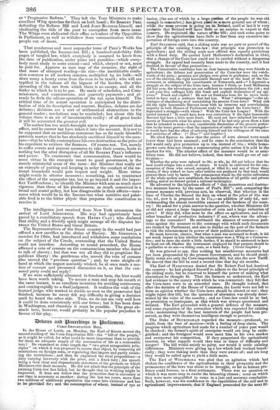That ponderous and most unpopular tome of Paces Works has
been published, the Income-tax Bill ; a hundred-and-thirty folio pages of tangled law, which everybody is assumed to know from the date of publication, under pains and penalties—which every- body must study to some extent—and which, obeyed or not, must be paid for. Approve as men may of the measure, the sight of that mass of cramped reading—its size—the inextricable confu- sion common to all modern statutes, multiplied by its bulk—will draw many a hearty curse from the man to be taxed; who will see typified in the volume all the bigness of the burden, the wide- spreading of the net from which there is no escape, and all the bother to which he is to be put. He reads of schedules, and Com- missioners, and examinations, and quarterly payments ; and al- ready he feels the odious operation of the tax upon himself. The critical time of its actual operation is anticipated by the distri- bution of this its description and warrant. Besides, debates are but debates ; divisions are a sort of arithmetical abstractions to the general reader ; resolutions may be rescinded ; but about this big volume there is an air of incontestable reality : of all great books it will be accounted the greatest evil.
The author has too much foresight not to have preconceived that effect, and be cannot but have taken it into the account. It is not to be supposed that an ambitious statesman has so far made himself a patriotic martyr that he has absolutely sacrificed himself to the mea- sure—that he wholly contemplates his own destruction as the price of his expedient to retrieve the finances. Of course not. Yet, merely to suffer events and present measures to take their course, leads to nothing but the utter disruption of all Sir ROBERT PEEL'S influence and power. To counteract that consummation, there would be some virtue in the energetic resort to good government, in the merely ministerial sense of the term : the Minister that really set an example of putting and keeping in order the conduct of the na- tional household would gain respect and weight. More virtue might reside in ulterior measures ; something, not to counteract the effect of the unpopular tax, but to go beyond it and the imper- fect Tariff-reform ; to identify the Minister with acts as much more vigorous than those of his predecessors, as much conceived in a broad and sound policy, but less disagreeable in their effects—mea- sures which would be to the Income-tax what nutritive and palat- able food is to the bitter physic that prepares the constitution to receive it.


























 Previous page
Previous page